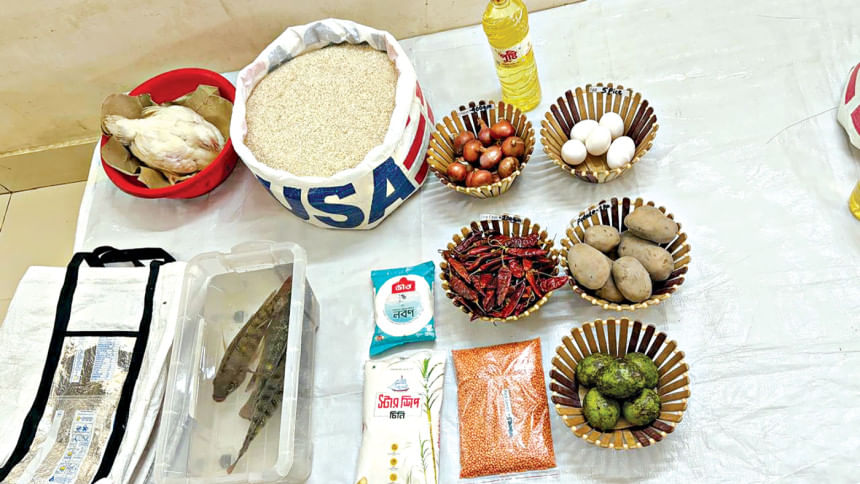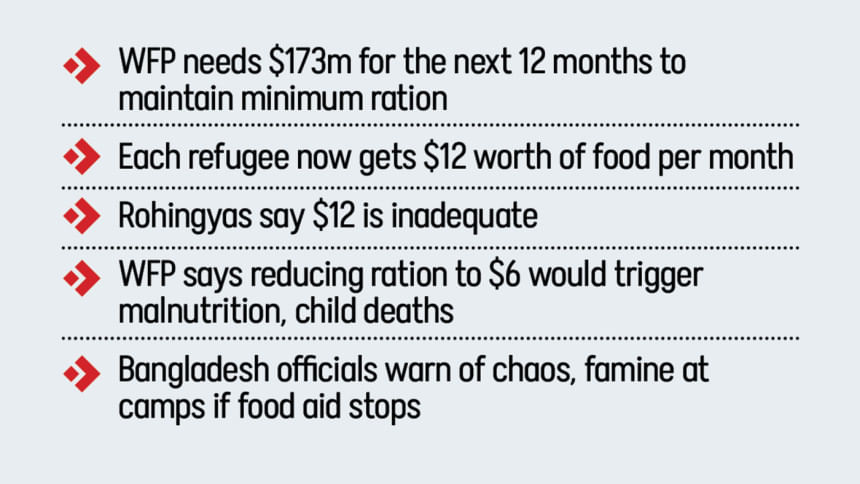Rohingyas may go hungry after November: WFP

Food assistance for over 1.2 million Rohingyas in Bangladesh will end after November 30 unless urgent funds are secured, the World Food Programme has warned.

"We have enough money until November 30. On December 1, the situation will be zero -- no food for 1.2 million people. To maintain the minimum ration, we urgently require funds," WFP Bangladesh Country Director Domenico Scalpelli told The Daily Star yesterday.
"We need around $173 million for the next 12 months," he said during a high-level delegation's visit to Cox's Bazar Rohingya refugee camps, warning that any further cut from the current $12 per person per month would be devastating.
"If we drop it to $6, malnutrition rates will rise, and children will die. Already the malnutrition rate is very high," Scalpelli cautioned, appealing to traditional donors as well as Gulf states, ASEAN, and OIC countries for immediate help.
Currently, each person's $12 (around Tk 1,500) food basket includes 13kg of rice for Tk 650, one litre of vegetable oil for Tk 180, half a kilogram of salt for Tk 19, 200g of red chilies for Tk 23.40, five eggs for Tk 53, 400g of onion for Tk 26, 500g of lentils for Tk 47.60, 1kg of sugar for Tk 109, 510g of tilapia fish for Tk 113, 1kg of potato for Tk 14.70, 1kg of chicken for Tk 172, and 1kg of hog plum for Tk 39.
If the ration is cut to $6 (around Tk 730), the probable food basket would include only 8kg of rice for Tk 400, 1.33kg of red lentils for Tk 127, 1 litre of soybean oil for Tk 180, 300g of salt for Tk 10, and 100g of red chilies for Tk 12, according to WFP estimates.
Scalpelli stressed that continued support is essential as the Rohingyas cannot simply stop eating after November. "They want to return home, but until safe and voluntary repatriation is possible, they must be able to eat every day."
A Rohingya man at a food distribution centre said the support is already too little. Requesting anonymity, he said, "Families survive on this little amount by cutting meals and going into debt. If this falls further, malnutrition will rise and unrest will grow inside the camps."
BANGLADESH CAN'T SHOULDER ALONE
Chief Adviser's Deputy Press Secretary Azad Majumder, who briefed the media during the visit, said nearly 100 delegates, including diplomats, UN officials, and NGO representatives, toured hospitals and distribution centres.
"What they have seen is that support for the Rohingya is shrinking by the day. WFP has informed them that if no new funding arrives, food assistance will stop after November. That means potential chaos in the camps, even famine," he said.
Azad also said the current ration is already inadequate and if it is reduced further, the humanitarian disaster will be severe.
"Bangladesh alone cannot handle this, not even the UN agencies. Without funds, assistance cannot continue," he added, pointing out that the Rohingya population is rising while aid is declining.
The delegation's visit marked the final day of the three-day international conference in Cox's Bazar, "Stakeholders' Dialogue: Takeaways to the High-Level Conference on Rohingya Situation".
Azad Majumder said delegates were brought to the camps so they could directly observe the looming crisis. "We want them to carry this appeal to international forums and donor capitals so that aid to the Rohingya remains uninterrupted. Without it, Bangladesh fears a grave humanitarian emergency," he said.
As the conference closed, the message from both government and UN agencies was clear: unless the international community urgently steps up, food supplies for over a million refugees will vanish, which may turn an already fragile crisis into catastrophe.
During the first two days of the conference, the sessions focused on humanitarian assistance, confidence-building measures, accountability, and a roadmap for lasting resolution, with the primary aim of gathering Rohingya voices and stakeholder inputs ahead of the UN High-Level Conference.
The dialogue highlighted declining funding, and Myanmar's systematic persecution and discriminatory laws such as 1982 Citizenship Law as root causes of the crisis. Panelists cited ongoing human rights violations in Rakhine, including indiscriminate attacks, arson, mass killings, rapes, and forced conscription by both the Myanmar military and the rebel Arakan Army group.
Participants also expressed concern over the pressure on Bangladesh, particularly host communities and the environment in Cox's Bazar and Bhasan Char, while acknowledging Bangladesh's generosity.
They called for proactive roles from neighbouring countries, ASEAN, the UN, and other partners. Key recommendations included amplifying Rohingya voices, ensuring sustainable repatriation, continuing humanitarian assistance through enhanced donor commitment and equitable burden-sharing, dismantling internal displacement camps in Sittwe and northern Rakhine, and supporting international justice mechanisms including IIMM, ICJ, and ICC.


 For all latest news, follow The Daily Star's Google News channel.
For all latest news, follow The Daily Star's Google News channel. 



Comments